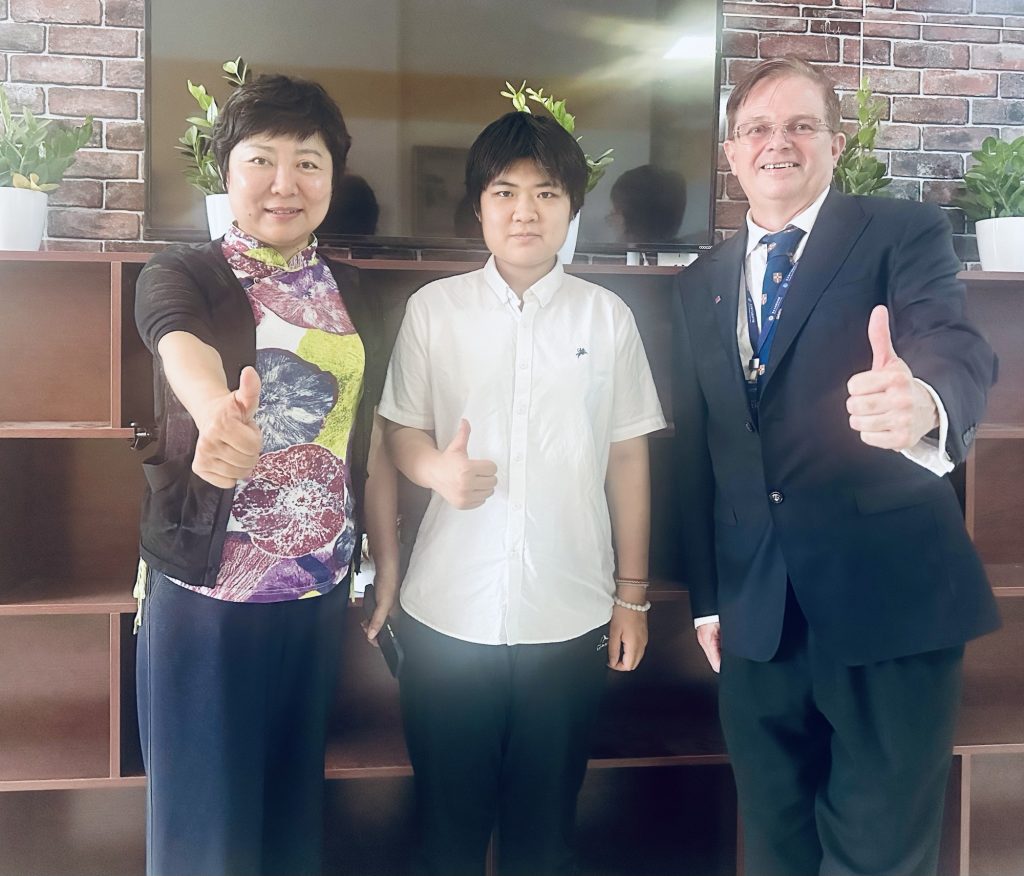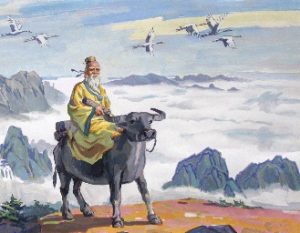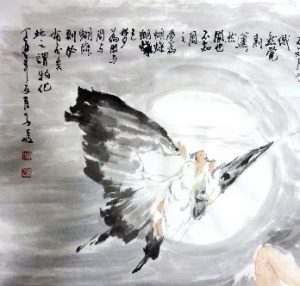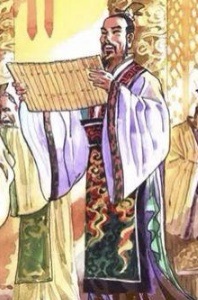
SACU is dedicated to supporting each new generation of bridge builders between the people of China and the people of Britain. One of our most important expressions of this commitment is our annual essay competition which offers young people in both China and Britain the opportunity to research themes of mutual interest to both countries. In 2024 the given topic was both challenging and very rewarding:
“How do you see harmony in the cultural context of China and/or the UK?”
As Headmaster of a Chinese International School in Beijing, I found this topic to be inspirational. I was able to weave around the concept of ‘harmony’ a series of stimulating and thought provoking discussions with my students aged 15-18, most of whom will come to study in the UK. This in turn led to very productive critical and creative thinking. In short, through participating in the SACU competition, my students had a superb introduction to the research that will be required of them in their English universities.
Today in the Blog I want to share extracts from the prize-winning essay submitted by Lv You. Lv You is seventeen years old and following international A Level courses. Her hometown is in the Xinjiang area of North-West China. She describes herself as being ‘infected by’ our school’s ‘self-taught educational philosophy, and the school’s social environment’. She says that her aim in life is to be ‘a pioneer’, like the character of Larry Darrell in the Somerset-Maugham story ‘The Razor’s Edge’.

The sentence ‘Dao produced one, one produced two, two produced three, three produced everything’ is attributed to Lao Zi, one of the earliest philosophers in China and appears in the Tao Te Ching. This text has been improved to adhere to desired characteristics such as objectivity, comprehensibility, logical structure, conventional format and language register. No changes have been made to the content. The concept of Dao refers to achieving harmony which has been a long-standing goal for Chinese people. In any environment, the aim is to achieve self-harmony by remaining calm and cultivating a peaceful attitude. Initially, harmony refers to inner peace and alignment with one’s temperament and body. As awareness expands towards the outside world, harmonious coexistence between humans and nature emerges.
Additionally, when living in groups it becomes important to strive for harmony which encompasses personal well-being as well as that of our surroundings. It also plays a crucial role in the growth of both plants and animals. Nations and societies also aspire towards achieving harmony as their ultimate goal. Therefore, it can be concluded that harmony is essential worldwide. If there were a continuous presence of harmony within countries, it could prevent global conflicts from occurring.
The conflicts during the colonial period in North & South America serve as bitter lessons from history. War represents a serious lack of social harmony both between nations & within them. In society, disharmony arises due to class inequality, for example, between slaves & slave owners. Clear class division often leads to disharmony seen on the lower end spectrum, resulting in quarrels or fights among ordinary civilians.

If there were a continuous presence of harmony within countries, it could prevent global conflicts from occurring.
It is crucial for society and the world to maintain harmony, which signifies peace between nations and fewer conflicts among citizens. The most significant benefit of harmony is the prevention of war, enabling countries to focus on economic growth and development, ultimately improving living standards for all. Taking Germany as an example after World War II, the country prioritized economic reconstruction and demilitarization of its national economy. This policy allowed for the concentration of limited resources towards rebuilding the economy, leading to a quick recovery and maintaining Germany’s position as a powerful nation.
In summary, throughout history, harmony has been essential in the coexistence between nature and humans as well as among individuals. It enables positive development and creates a better society.

Zhuangzi was a famous Chinese philosopher from 369 to 286 B.C. He had a profound philosophical revelation in a dream. He was transformed into a happy butterfly and lost all memories of his original Zhuang Zhou. Upon awakening, he could not tell whether he was Zhuang Zhou or the butterfly in his dream. Zhuangzi himself was a great lover of nature, and he put forward the idea that “Heaven and earth are symbiotic with me, and all things are unique to me”. In my opinion, his idea is that the development of human beings needs to follow the laws of nature, and if the laws of nature are followed, then human beings will survive and reach the realm of symbiosis with nature and longevity.
True Chinese thinkers often harshly demand that they first achieve a state of harmony within themselves, then tolerate others, and then teach others to reach a state of harmony as well. Moreover, filial piety is one of the most important elements in the profound Chinese culture, and one of the most famous stories is “Rong, at the age of four, was able to give up a pear to his elders”. Filial piety is in fact one of the main factors of family harmony, which has been proposed since the beginning of Chinese history. If one is obedient to one’s elders, the elders will patiently teach the younger ones, and this is a kind of family harmony.
Confucius once said in his own work, The Analects of Confucius, “A gentleman stores up but does not contend; a group is not a party.” Another example is the Rites of Passage, which says, “Therefore, people do not only kiss their relatives but also do not only give birth to their children. So that the old have an end, the strong have a use, the young have a growth, and the widowers, widows, orphans, invalids and the sick are all supported.”
Confucius, Mencius and Taoism’s most fundamental idea of social harmony is that in a harmonious society, there is no need for a monarch’s leadership, and that the people can distribute production and coexist peacefully with each other on their own. Although the idea of a commonwealth society devised by the ancients was utopian, the culture of harmony it advocated as a noble goal and ideal state has led China for thousands of years and continues to this day as a socialist communist state.
In terms of relations between peoples and nations, and between nations and countries, it advocates harmonious coexistence and concord among all nations. In the Shangshu and Yao Dian, it is said, “The people are in harmony, and all nations are in harmony.” Zhou Yi Qian Gua says: “The first of the common people, all nations are in peace.” In other words, it advocates the unity of all nations and harmonious coexistence. Advocating the way of the king and opposing hegemony. Authority is the opposite of hegemony; hegemony is the use of force as a backing for domestic and international relations; authority is the use of peaceful means to expand one’s influence through the establishment of a relationship of mutual trust at the international level. This is exactly how China today has established friendly relations with various countries in the world.

Throughout Chinese history, politicians and rulers have pursued harmony as a means of creating a harmonious nation. During the Spring and Autumn Period in the state of Qin, a renowned statesman named Shang Yang introduced numerous political reforms that fostered harmony. One particularly noteworthy reform was the establishment of a legal system that prohibited private fights. In the past, seeking revenge through physical combat was considered an act of filial piety encouraged by society.
However, Shang Yang believed that punishment for crimes should be a public matter and not hindered by personal rights. He asserted that the right to seek revenge fell within the jurisdiction of the state’s public authority, thus forbidding private fights among individuals. This practice significantly contributed to societal harmony at that time. Although it involved coercion at a legal level, it successfully promoted peaceful coexistence and resolved grievances, leading to improved social development. This transformation turned the country into a powerful nation within one generation.
In the course of the development of today’s Chinese communist society, China has continued to uphold the principle of ‘building a harmonious socialist society’, as it has in the past. Since the construction of China 70 years ago, the government has consistently upheld the principle of developing a harmonious society. As a result of China’s reform and opening up, the per capita disposable income of residents has increased from RMB 171 yuan to RMB 28,200 yuan. The number of poor people in China has been reduced from 770 million in 1978 to 16.6 million in 2018, contributing to the building of a moderately prosperous society in all respects. Chinese society has made significant efforts to improve the living environment, resulting in a better quality of life. This has led to a gradual convergence towards a harmonious society.
Conclusion
Harmony in British philosophical thought is still somewhat different from that in Chinese thought. In Chinese philosophical thought, philosophers tend to emphasise harmony between man and nature, and between man and man. Harmony is regarded as an important value and concept of life in traditional Chinese culture. The concept of harmony proposed by Western societies may be more influenced by Christian culture and philosophical thought, which emphasises individual freedom, equality and justice, and respect and tolerance in social relations.
However, whether it is the ideal state proposed by the great Western philosopher Plato thousands of years ago, or the idea of harmony as the most precious thing advocated by Confucius in the Analects of Confucius, the emphasis is on the important role of harmony in the relationship between human beings and society.
True harmony cannot exist in the real world, where strife occurs all the time because of factors such as war and social disputes. Yet most people still follow the will of Plato and Confucius to maintain harmony. In my opinion, every citizen of the world should be educated in the philosophical idea of harmony, so that harmony exists in everyone’s heart, and the world will become an ideal utopia. Only then will the world become an ideal utopia, whether it be social communism, represented by China, or the Western capitalist free market, which will remain in a state of harmony and equilibrium.
(Images sourced by Lv You)